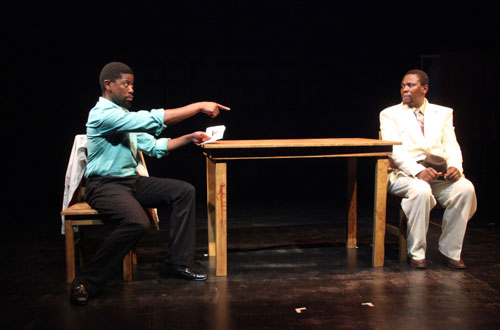Sizwe Banzi (currently earning consecutive cheers at the Baxter Theatre) is packed with impressive credentials. Directed by John Kani, who wrote the play with Winston Ntshona and Athol Fugard in 1972, it's a masterpiece of simplicity. A story of what it means to be human. Or as our friends in New York say: "A joyous hymn to human nature."
And, of course, they are right. In 2015 it's not so much about race as it is an investigation of our reaction as a species when we have to weigh pride with survival. What starts in a Ford factory - and a humorous anecdote about what it means to be non-white and put in charge when the boss man can't speak your tongue - takes a dramatic turn on a dark street corner when a body is found - and an ID card that will grant its holder a new life. The catch? You have to change your name.
The severity of the situation and the comical moments created make Sizwe feel all too real. The two leading actors - Atandwa Kani and Mncedisi Shabangu - have a back and forth that reaches soul-piercingly poignant moments and heart-stealing chuckles. Often unpredictably.
Race segregation
Beyond its tasteful Kafkaesque rendering of race segregation - and even beyond its several Tony and Drama Desk Awards - Sizwe has street cred. It's earned its rightful place for sheer boldness - a play written by an interracial circle of friends during the most intense era of political strife in South Africa.
But the Sizwe Banzi of today presents an interesting conundrum - both Dr John Kani and Atandwa (his son and leading star) knew that performing this play could alter their lives forever. And possibly for the worse.
John could be locked up (he was, for 23 days), but change the world (he did, the world protested in unison when he was detained ); and Atandwa has been left with huge shoes to fill (especially because in 2015 there is no clear and present danger).
Apart from the memories and emotions John passed on to his son, this is pure acting that gives way to an entertaining thrill previously unforeseen.
The keen critic will be happy to know that any and all facial wincing is convincing as it was in 1972 (when it premiered), but the timing couldn't have been any better. It reflects a current South Africa that's ever moving closer to millennial culture - one that's trying to both impress and improve its heritage.
Vexing subtleties
A tall order with vexing subtleties that didn't exist in 1970. In a Cape Talk interview Atandwa was asked about the revival of classic protest theatre pieces and why we there a no new ones today. His answer: " ... these days you don't get potency. The narritve [right] now is an individual [one]. You can be defined by the greater mass, but who is the individual in that community?"
If the story of Sizwe Banzi tells us where we came from, it's 43rd anniversary shows where we've arrived and are going next. But like his character in 20th century classic states: "You never get in the way of a man's dreams." And: "There is nothing we can leave behind when we die except the memory of ourselves."
The truth still rings eternal. Everything about Sizwe play is still more than skin deep. Bravo.
Sizwe Banzi takes place till 12 September at the Baxter Theatre. Tickets range from R120 to R150 and are well worth it. More details at www.baxter.co.za/shows/sizwe-banzi-is-dead
















































